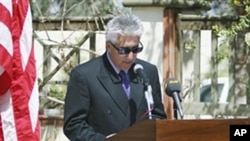A senior U.S. diplomat said Wednesday that he believes key figures in the Libyan government would like to break with Moammar Gadhafi, and are remaining in Tripoli only out of "terror and fear." U.S. Ambassador to Libya Gene Cretz, who was forced to leave the country late last year, says there is a consensus, even in areas held by government forces, that Gadhafi must step down.
There have been no high-profile defections from the Gadhafi camp since Libyan Foreign Minister and former intelligence chief Moussa Koussa made his way to Britain nearly a month ago.
But U.S. Ambassador Gene Cretz says Washington officials are in periodic contact with officials of the Tripoli government. He says at least some Libyan officials would like to follow Koussa’s lead, but that they are held back by fear.
"These are people who head agencies, and other technocrats," said Ambassador Cretz. "They would like to break, but they’re, number one, afraid for their lives. And they’re also afraid for their families. So I’m not sure that one can characterize the current situation as not having more successes. I think that the situation of terror and fear inside Tripoli is so great that people that I have known, and that others who normally up to now would have broken with Gadhafi, are not doing it for those reasons."
Cretz says a hard core of Gadhafi family members and leaders of military and security units close to Gadhafi have decided to make their last stand with the longtime ruler because they "probably don’t have a future" otherwise.
He says continuing U.S. outreach and NATO military strikes in recent days against the core elements of the government in Tripoli are intended, in part, to hasten the departure of wavering government figures.
"The actions that we are taking along with our coalition partners, what you saw the other day in terms of going after command and control centers in Tripoli, and in terms of our own continuing [efforts] to reach out to these people, will send some kind of signal to them that the time is fast approaching when they have to have a decision," he said. "And they can make a decision to either go down with the ship, or else change sides and reach some kind of agreement as to their future lives or the future lives of their family."
The ambassador had to leave Libya last December after two years in Tripoli, following the release by WikiLeaks of alleged U.S. embassy cables that portrayed Gadhafi in an unflattering light. The U.S. embassy was closed in February, after the civil conflict began.
The ambassador says he and his staff maintain contacts with Libyans from rebel-held and government controlled areas, and that there is a consensus that an end to the crisis requires Gadhafi’s departure from office.
Cretz says the death toll in two months of fighting in Libya could be as high as 30,000 people, although accurate figures might not be known until the conflict is over.
He calls Libya’s opposition Transitional National Council a "political body worth our [United States] support." But he says the United States is not ready to follow Italy, France and Qatar in recognizing the council as Libya’s legitimate government.
US Envoy Sees Splits in Gadhafi Camp




